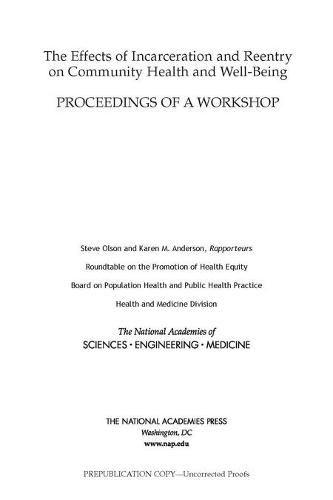Readings Newsletter
Become a Readings Member to make your shopping experience even easier.
Sign in or sign up for free!
You’re not far away from qualifying for FREE standard shipping within Australia
You’ve qualified for FREE standard shipping within Australia
The cart is loading…






The high rate of incarceration in the United States contributes significantly to the nation’s health inequities, extending beyond those who are imprisoned to families, communities, and the entire society. Since the 1970s, there has been a seven-fold increase in incarceration. This increase and the effects of the post-incarceration reentry disproportionately affect low-income families and communities of color. It is critical to examine the criminal justice system through a new lens and explore opportunities for meaningful improvements that will promote health equity in the United States.
The National Academies convened a workshop on June 6, 2018 to investigate the connection between incarceration and health inequities to better understand the distributive impact of incarceration on low-income families and communities of color. Topics of discussion focused on the experience of incarceration and reentry, mass incarceration as a public health issue, women’s health in jails and prisons, the effects of reentry on the individual and the community, and promising practices and models for reentry. The programs and models that are described in this publication are all Philadelphia-based because Philadelphia has one of the highest rates of incarceration of any major American city. This publication summarizes the presentations and discussions of the workshop.
$9.00 standard shipping within Australia
FREE standard shipping within Australia for orders over $100.00
Express & International shipping calculated at checkout
The high rate of incarceration in the United States contributes significantly to the nation’s health inequities, extending beyond those who are imprisoned to families, communities, and the entire society. Since the 1970s, there has been a seven-fold increase in incarceration. This increase and the effects of the post-incarceration reentry disproportionately affect low-income families and communities of color. It is critical to examine the criminal justice system through a new lens and explore opportunities for meaningful improvements that will promote health equity in the United States.
The National Academies convened a workshop on June 6, 2018 to investigate the connection between incarceration and health inequities to better understand the distributive impact of incarceration on low-income families and communities of color. Topics of discussion focused on the experience of incarceration and reentry, mass incarceration as a public health issue, women’s health in jails and prisons, the effects of reentry on the individual and the community, and promising practices and models for reentry. The programs and models that are described in this publication are all Philadelphia-based because Philadelphia has one of the highest rates of incarceration of any major American city. This publication summarizes the presentations and discussions of the workshop.